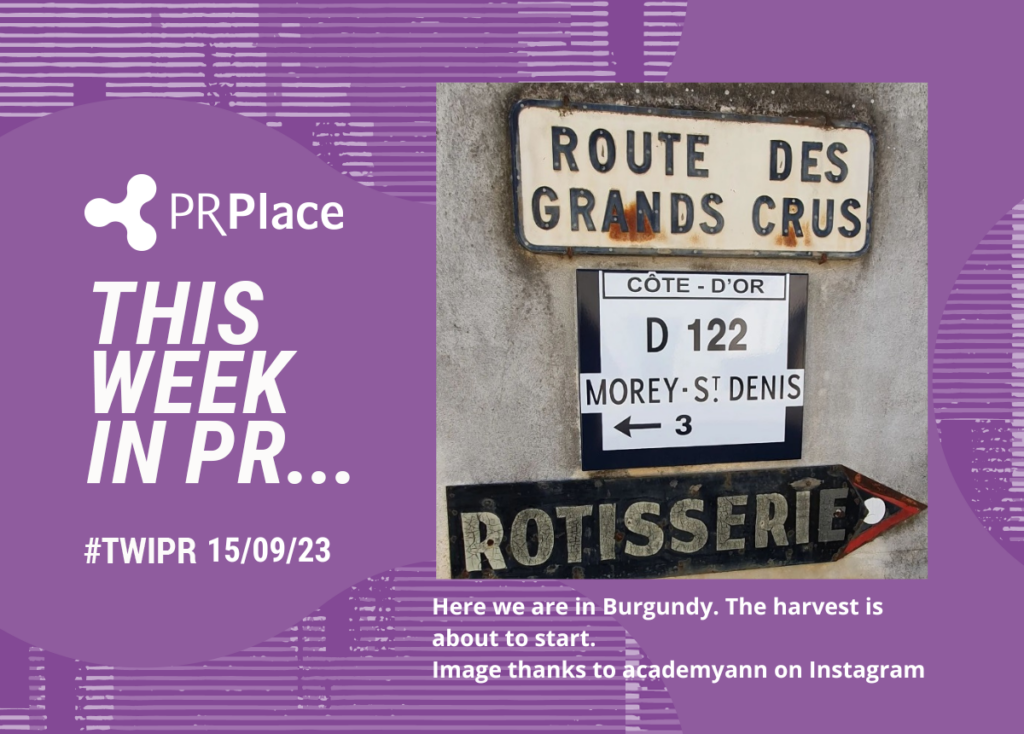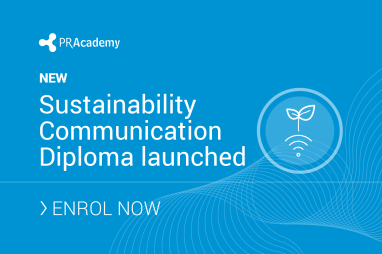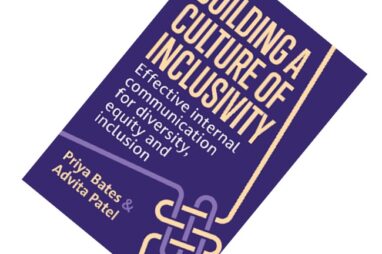This week in PR (15 September)

About the author
Richard Bailey Hon FCIPR is editor of PR Academy's PR Place Insights. He teaches and assesses undergraduate, postgraduate and professional students.

Profession and ethics
Purpose, climate and ESG
SUSTAINABILITY COMMUNICATION DIPLOMA
- Dan Gold and Farzana Baduel: Navigating Purpose and Change in Global PR with David Gallagher
(13 September)
‘I’m happy to say we got most of it right [in the book]. We at least gave people ample warning that expectations were changing – though I wish we’d spent longer on ESG. We should also have delineated the difference between brand purpose and organisational purpose.’ - Ong Hock Chuan: No Shortcuts to Being Authentic (no date)
‘There are no short cuts to authenticity. It is not some communication or branding exercise, it starts with your character. If you’ve not developed one or are not planning too then reconcile yourself to being ersatz rather than authentic.’
- Anna Lelia with Stuart Lambert: Purpose Conversations: How to integrate ESG into your organisation [podcast] (11 September)
‘Our argument is that ESG and purpose must be integrated if companies are to deliver positive impact on the world. If ESG is about minimising negative impact, purpose should be about maximising positive impact in terms of long-term wellbeing of people and planet.’
Consulting, skills and careers
- Son Pham: Why chief communications officers can become effective CEOs (13 September)
‘Successful CEOs are expert communicators who can’t make things up when they’re at the epicentre of a crisis. They must be well prepared and see round corners.’
- Louise Thompson: We need courageous communications leaders now more than ever – here’s why & here’s how (12 September)
‘Corporate Communications is stressful because it matters. What we do (and crucially what we don’t do) has consequences.’ - Andy West: The Power of the Alumni Network (8 September)
‘Going back to my days at Text 100 and more recently at Hotwire, I have witnessed dozens of ex-colleagues over the past 30+ years who have gone on to achieve incredible success both agency and client side all around the world.’
Gender, diversity, health and wellbeing
So inspiring to hear from @IamVickyA about her story from Hackney to Cambridge Uni and beyond, and the importance of mentoring and networks in social inclusion, at the @PRCA_HQ equity and inclusion conference #prcachangeforgood pic.twitter.com/xmg9G3UUnQ
— Maja Pawinska Sims (@SparklyPinchy) September 14, 2023
- Ben Smith: Jo Carr, president of Women in PR on the PRmoment Podcast (13 September)
‘Data from Women in PR indicates that only a third of board level positions in PR are occupied by women. We are losing legions of brilliant women on their career journey; they’re literally falling out of our industry.’ - Shilpa Saul: The importance of co-creation in inclusive comms campaigns (8 September)
‘In my role as inclusive communications director at The Unmistakables, I speak to agencies on a daily basis who are attempting to navigate a path through the apparent disconnect between what audiences want, what clients want and what traditional media wants.’
Politics, public affairs and public sphere
- Imogen Shaw: Labour says it would be open to EU immigration quota – sparking Tory criticism (14 September)
‘Labour knows that Starmer’s position on seeking closer cooperation with the EU on immigration is something of a red rag to the Conservative media operation.’ - Ben Rogers: The scrapping of nutrient neutrality – the Government’s move to unlock development (14 September)
‘Recently, the National Trust, Green Alliance, RSPB, and other charities have berated the Government for reneging on pledges to halt the decline of nature. Many have argued that the UK cannot afford any legislative regression in this particular environmental area.’
- James Boyd-Wallis with Jane Wallace: Advocating for people and ideas (13 September)
‘The heart of public affairs lies in advocating for ideas and people. I love the challenge of identifying issues that resonate with the public and translating these into impactful campaigns.’ - Drew Aspinwall: Veering slowly, losing identity (12 September)
‘Whilst the government’s ambition was to increase the amount of energy produced by offshore wind to 50 gigawatts (GW) from the current 14GW by 2030, for the industry, the current maths just doesn’t add up, hence the lack of response.’
- Beth Tarling: Perception vs reality: The power of the narrative around our green and pleasant land (12 September)
‘The figures from Ipsos paint a complex and nuanced picture of views towards housebuilding and the role the Green Belt has to play and, importantly, tell a familiar story about how certain narratives can influence views and distort reality. Words like ‘green’ and ‘brown’ are unhelpful and overly simplistic – something which the story of the Green Belt, and the housing crisis, is not.’
- Phil Briscoe: More batteries, please! (12 September)
‘The UK government has funded five battery storage research projects with concepts such as a single liquid flow recyclable battery being developed in Edinburgh, and a hydrogen storage system using depleted uranium from test fusion reactors being developed by EDF, the University and Bristol and the UK Atomic Energy Authority.’ - Lucy Farrell: In Conversation with Steve Richards — An Agenda-Setting Return to Westminster (8 September)
‘Echoing the rhetoric of Blair’s 1997 campaign, Labour will lean heavily into the theme of science and technology to regenerate public services and generate growth.’
Brands, content, community and creativity
- Danny Rogers: The Rugby World Cup is on – why don’t people care? (10 September)
‘Therein lies the biggest challenge for English rugby: the domestic leagues are underperforming in terms of talent development, attendance at matches and TV viewing figures for Premiership Rugby.’
Crisis, risk and reputation
- Dolores Cowburn: Lucy Letby: A Global Story and a Local Force (12 September)
‘Issuing the video, giving all the information and access to the team in this way, was an inspired and sensitive thing to do. It enabled the Cheshire police to take control of the narrative around the inquiry and direct it to audiences immediately without any editing by the media.’
- Stuart Thomson: Don’t fall into the ‘outrage washing’ trap (8 September)
‘Whatever an organisation says initially, needs a long tail of action. Being outraged and taking responsibility is one thing, delivering the change required is much harder.’
Behaviour and influence
- Scott Guthrie: Esme Rice: Mindshare Worldwide Influencer Practice Lead [podcast] (14 September)
‘I think influencer marketing is a completely different channel; it’s much more of a human-based approach.’
Internal communication
Internal Communication Diploma
- Katie Macaulay with Shil Shanghavi: How to crush your next public speaking gig [podcast] (13 September)
‘Drop the script. Scripted answers mean we’ve pre-planned it. Putting people on the spot means there’s a better chance of getting true emotion rather than choreographed emotion.’ - Jenni Field: Remotely interested?… reloaded for 2023 (11 September)
‘The results are eye opening for those of you who are looking to improve communication and engagement with frontline/deskless workers.’
Media, digital and technology
- Tom Flynn: The SEC Newgate AI Weekly (14 September)
‘The conversation around AI has already started to move from the tech press into the wider media, so it was no surprise to see Mustafa Suleyman, co-founder and CEO of Inflection AI, on Robert Peston’s ITV show this week alongside the usual assortment of political guests. In a fascinating discussion, Suleyman talked about his belief that AI is the first technology to ‘enable smaller groups of people to have an outsized impact on the world’. - Paul Sutton with Stephen Waddington: Need to know: the impact of AI on communications [podcast] (13 September)
‘I’ve stopped looking at the shiny new toys because it’s software developers pushing functions into a market that might or might not be particularly useful; I think it’s much more useful to break down the tasks that you have within your domain and then look for tools to support that. For almost every aspect of public relations activity there’s an AI tool now to help and support what you’re doing.’
- Neville Hobson: Claude Pro: First impressions of Anthropic’s paid AI chatbot (13 September)
‘Generative AI [is] the subset of AI that, broadly speaking, is a form of machine learning that’s able to produce text, video, images, and other types of content based on user-given text prompts or dialogue. Essentially, you chat with a bot.’ - Rafiat Gawat: Pay-to-play for visibility: Navigating the media landscape where earned media is not the norm. (12 September)
‘Remember, your focus is on building credibility and goodwill. Therefore, maintaining authenticity and delivering value should be prioritized. To create long-term success, you have to create meaningful experiences and build relationships with your audience and the channels to reach them.’ - Orlagh Shanks: Why YouTube Is My Favourite Social Media Platform (11 September)
‘Creators seem to be more vulnerable on YouTube than they are on TikTok or Instagram. They’ll often say their YouTube viewers know the ‘real them’ as they see the good times, the bad and everything in between.’
Academic, education and training


